How do Barcelona keep thrashing Real Madrid in El Clásico?
Real Madrid have more league titles and European Cups and more wins overall in El Clásico, but Barça's victories have often been by bigger margins. So what's behind it?
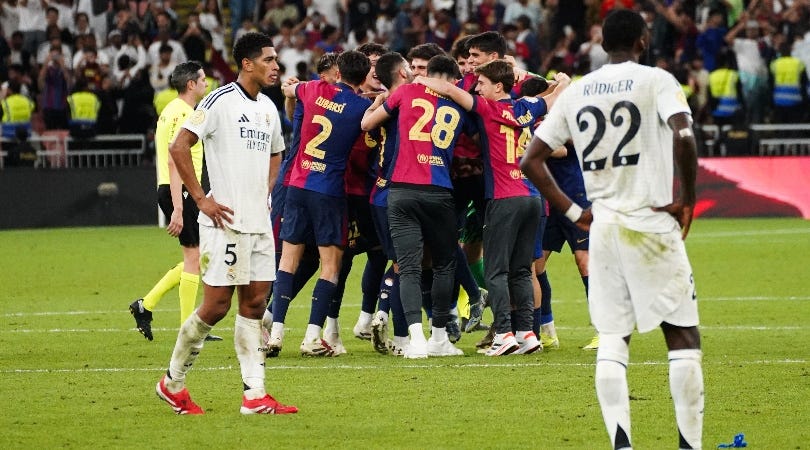
There is no bigger fixture in football than El Clásico. Real Madrid against Barcelona is a match-up which extends far beyond the teams’ respective playing philosophies to politics, nationalism, culture, history and much more. Whenever the two teams meet, the world watches.
As many of you will know, I lived in Spain for almost 15 years and was fortunate enough to cover El Clásico on multiple occasions – both at the Santiago Bernabéu and at Camp Nou. It was often thrilling and never, ever dull.
More recently, Madrid and Barça have met in Saudi Arabia in the Supercopa de España, a four-team tournament these days which is played annually in either Riyadh or Jeddah. On Sunday, the two rivals faced off in the final again and despite going behind early on, Barcelona battered Real Madrid 5-2 in a one-sided contest.
It was the second time in a row that Barça had humbled Madrid, with Hansi Flick’s side 4-0 winners at the Santiago Bernabéu back in October. Those two results would suggest that there is a big gulf between the two teams right now, that Barça are far superior to their eternal enemies, yet that is not exactly the case. Despite a strong start under Flick, Barcelona are currently third in LaLiga, having suffered a dramatic dip in results at the end of last year and had gone into the Supercopa in something of a crisis after struggling to register summer signing Dani Olmo for the second half of the season. A year ago, Madrid won 4-1 when the two teams met in the final of the Supercopa and Real went on to claim both LaLiga and the Champions League.
But Barça have hammered Madrid in both meetings this term and, in recent years, there have been a series of big wins for the Blaugrana against their fiercest foes – even in some of the Catalan club’s darkest days, amid financial woes and institutional crises. Overall, it is Real that are the more successful of the two clubs in LaLiga and in the European Cup, and yet the biggest margins of victory have historically and also lately been in FCB’s favour. So how do Barça keep thrashing Madrid in El Clásico?
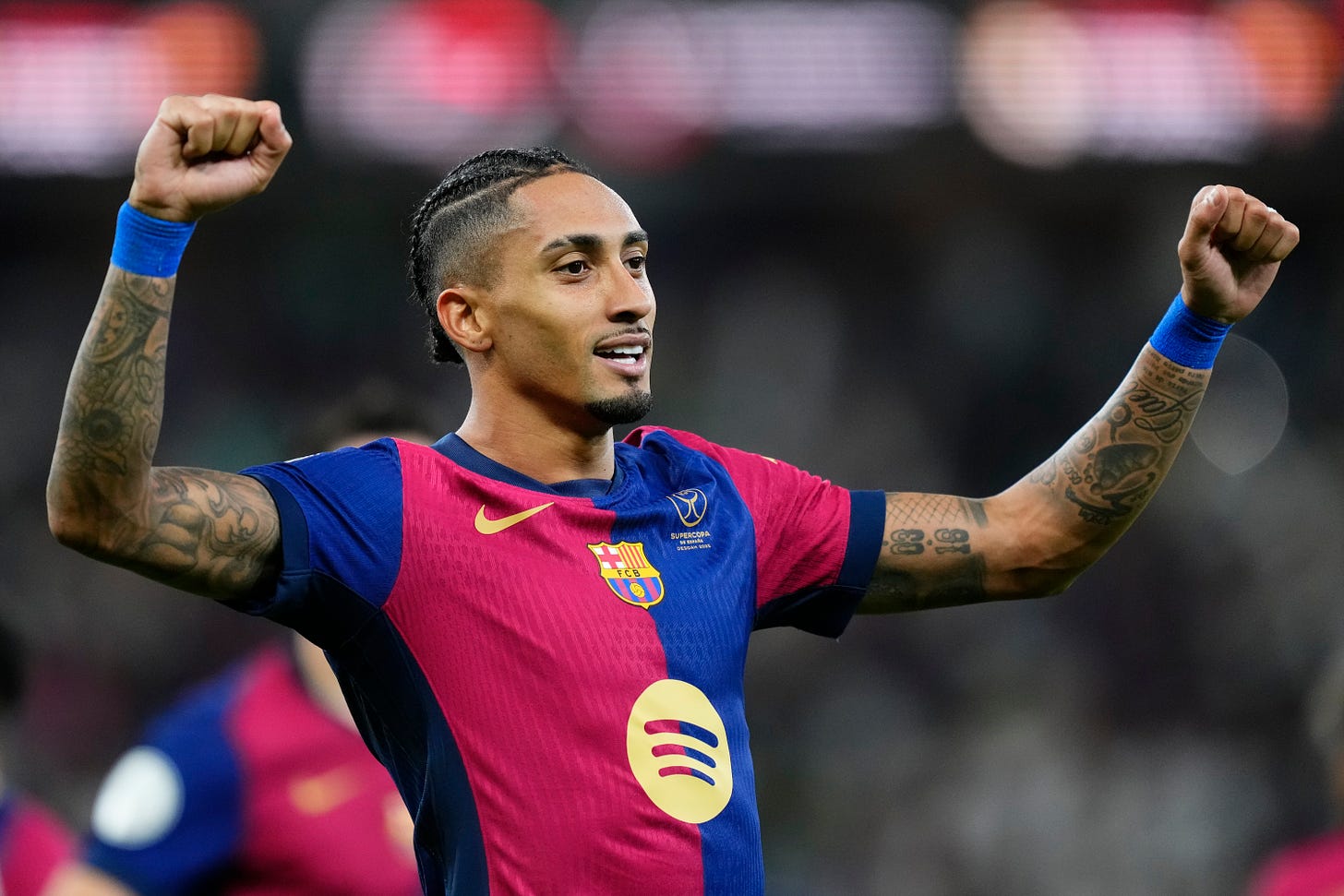
I spent over eight years in Barcelona and just under six in Madrid, often travelling between the two cities to cover the big games. During my time in the Spanish capital, Real Madrid won the Champions League three times in a row between 2016 and 2018. Los Blancos were dominant in Europe. But only one of those seasons brought a league title for Real and in El Clásico, they certainly didn’t have things their own way.
Speaking with Real Madrid fans or journalists who were supporters of Los Blancos, I sometimes suggested that their team had been fortunate to avoid Barcelona in that run of Champions League victories. This did not usually go down well. But there was an element of truth it it: Europe’s elite clubs seemed to shrink and suffer stage fright when facing Real Madrid. Barcelona did not. The Catalans had their own issues in Europe, but always seemed to perform well in El Clásico.
“Europe fears Real; Madrid are scared of Barça”

“Europe’s top clubs are scared of Madrid,” it was sometimes said. “Madrid are scared of Barça.” That was probably an exggeration and an over-simplification, but during Los Blancos’ three-peat in the Champions League, Real won only one of five games against Barça in La Liga, losing 3-2 at home to their rivals in April 2017 and going down 3-0 at the Santiago Bernabéu in December the same year. Zinédine Zidane’s side did win both Supercopa de España clashes in August 2017 against a Barça side reeling from Neymar’s suprise exit and with Ernesto Valverde new in the job, but the Blaugrana went on to win La Liga comfortably as Los Blancos finished third and Valverde would go unbeaten in his next seven Clásico fixtures.
Before Zidane’s arrival, Madrid had lost 4-0 to Barça at the Bernabéu. And after his exit, Los Blancos were thrashed 5-1 at Camp Nou. A few months into Xavi’s reign, with Barça in a financial crisis and Lionel Messi long since departed, FCB won 4-0 at the Bernabéu in March 2022. Flick’s side repeated that result in October against the defending European champions and Sunday’s 5-2 victory over Barça was another humiliation for Los Blancos.
Back in the late 1950s, Madrid’s legendary side put together a run of five European Cup wins. In La Liga, Real won six out of the 10 Clásico clashes played in those five seasons, with Barça victorious in the other four. But the biggest win went to FCB: a 4-0 success at Camp Nou in October 1958. In the Copa del Rey, which was named the Copa del Generalísimo during Francisco Franco’s dictatorship, Barça beat Madrid 6-1 in the teams’ quarter-final second leg in April 1957 after a 2-2 draw at the Bernabéu. And in the semi-finals two years later, the Blaugrana swept aside Los Blancos 7-3 on aggregate. During that time, Barça’s players sometimes commented that for all their success in the European Cup, Madrid often struggled to beat them. It was true.
Does it mean more to Barça?
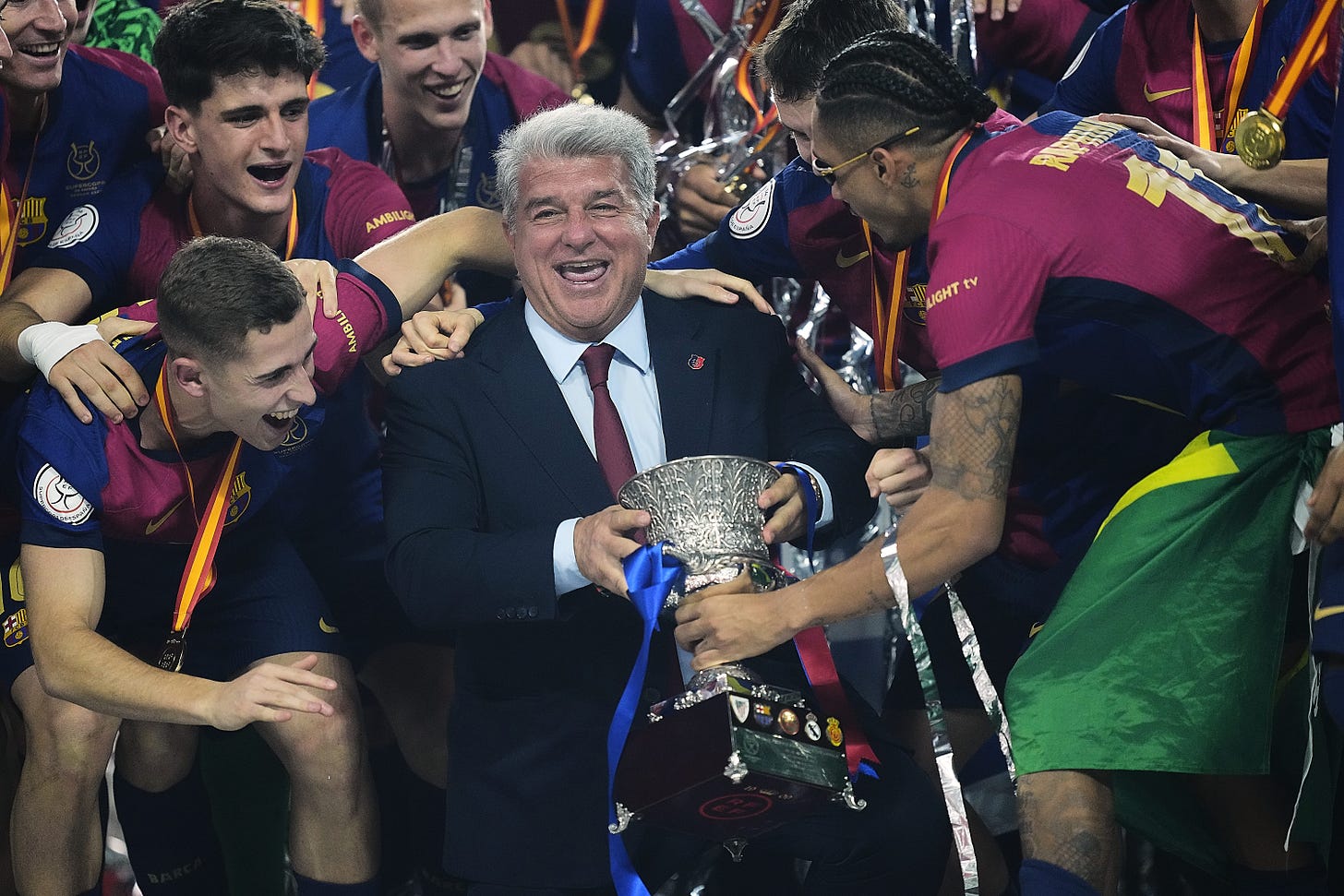
When I lived in Barcelona, I would often watch Real Madrid matches in a little bar on the corner of my street. In the first half, there were usually a few older men there following the game. But if Madrid were a couple of goals up at half-time, they would leave. Many Catalans watch Madrid in the hope of seeing them beaten and while the same happens the other way around in the capital, Barça fans’ dislike of Madrid seems, to me at least, to be more deep-rooted. In Barcelona, Real defeats are often celebrated more than Barça wins. That is rivalry, of course, but this rivalry is especially intense – and about much more than football.
Madrid are seen as the club of the establishment, the ruling power. And while it is often considered that Real were Franco’s club, that is an over-simplification. In fact, it is often said that Franco was a supporter of Atlético Aviación (now Atlético Madrid). What is true is that Real Madrid are today more associated with Spain’s right wing and Franco almost certainly used the club’s success to boost the nation’s image. Also true is the fact that languages like Basque and Catalan were prohibited by his dictatorship, with clubs forced to use Spanish names. During the regime, Barça were Barcelona Club de Fútbol instead of Futbol Club Barcelona and Athletic Club became Atlético Bilbao.
Many people in Catalonia today want independence from Spain, with chants in favour of secession heard at every Barça game. Real Madrid, therefore, have come to symbolise the opposition – in both sporting and political terms. Another common complaint is that Los Blancos are favoured by officials. The fact that LaLiga president Javier Tebas is a Madrid fan only fuels such theories. Real fans, of course, claim Barça have help, pointing to the Negreira case which led to corruption charges after the Catalan club were found to have made payments to the vice president of the Comité Técnico de Árbitros, the body in charge of officials in Spain, between 1994 and 2018.
So it probably does mean more to Barça. While Madrid have been happy to win this fixture over the years, FCB have often sought to run up a big score. To humiliate their rivals. The fact that Barça’s core comes from homegrown players at the club’s La Masia academy also adds special significance. Madrid, more recently at least, have had a largely international base. It is not quite the same.
Madrid’s style suits Barça
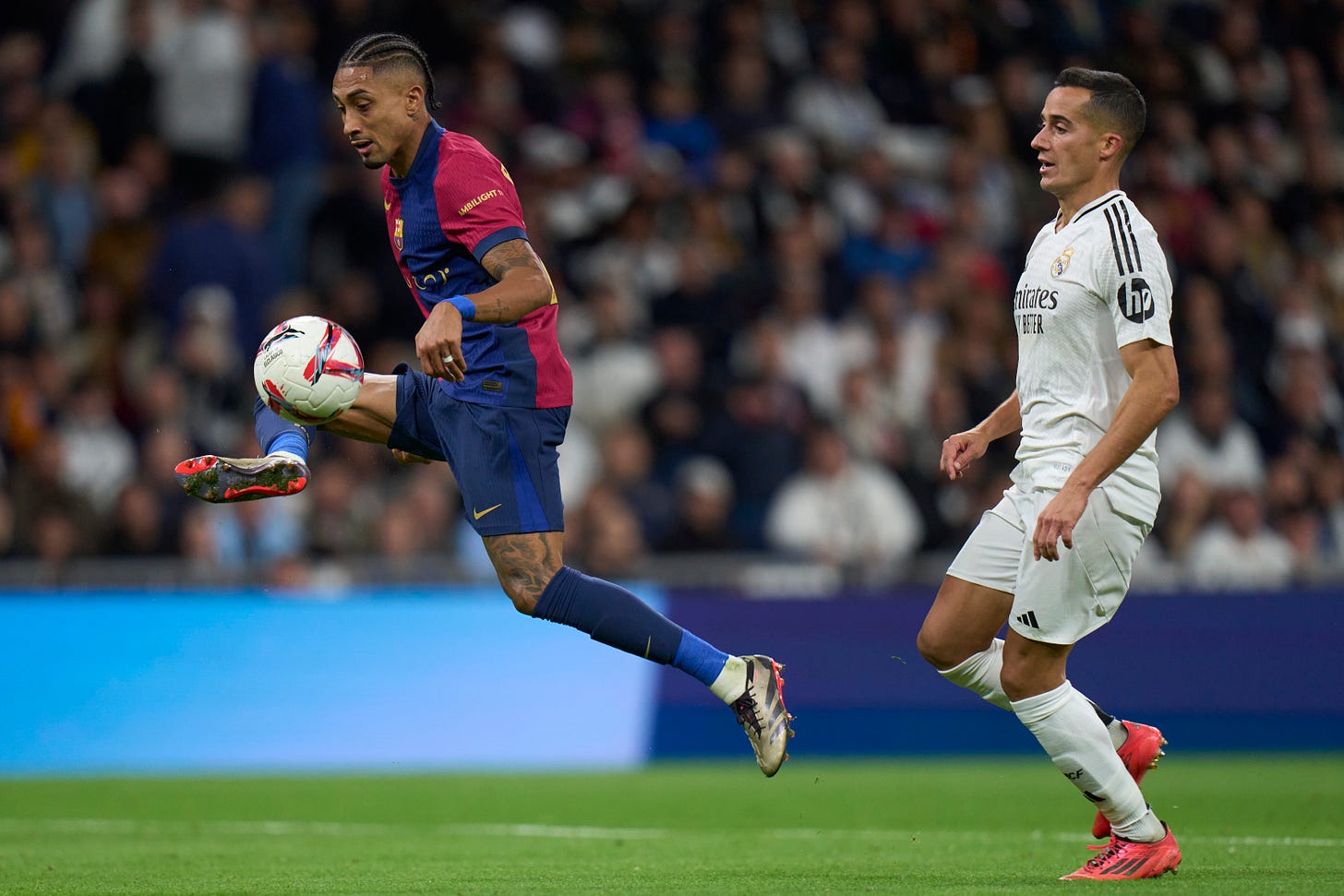
Barcelona have dropped points this season against the likes of Osasuna, Las Palmas and Leganés. Traditionally, the Blaugrana have struggled more against smaller sides squeezing the spaces and playing a low block. That has continued with Flick in charge, even though results have mostly been positive overall.
But against Real Madrid, Barça have more space to attack. And in Yamine Lamal and Raphinha, FCB are blessed with perhaps the two most on-form forwards in world football right now. That helps… a lot. With Dani Carvajal out long term due to a serious injury and those two in full flow, FCB have also been able to exploit Los Blancos’ right side where winger Lucas Vázquez has been used as a makeshift defender. That might work against LaLiga’s lesser lights where Madrid’s individual brilliance often sees them through, but it has not been good enough versus Barça.
It is well known that Madrid want to sign Liverpool’s Trent Alexander-Arnold, who has been under severe scrutiny himself for his defending in recent seasons, but the England international would be a big upgrade and would add another dimension to the team’s attack. In the meantime, Lucas is not the solution in Carvajal’s absence and Toni Kroos has also been a big miss since his retirement in the summer. Perhaps of more concern on Sunday, though, was Madrid’s attitude. Even with Barça reduced to 10 men in the second half, Los Blancos never looked capable of mounting a comeback.
Could Carlo Ancelotti be sacked?
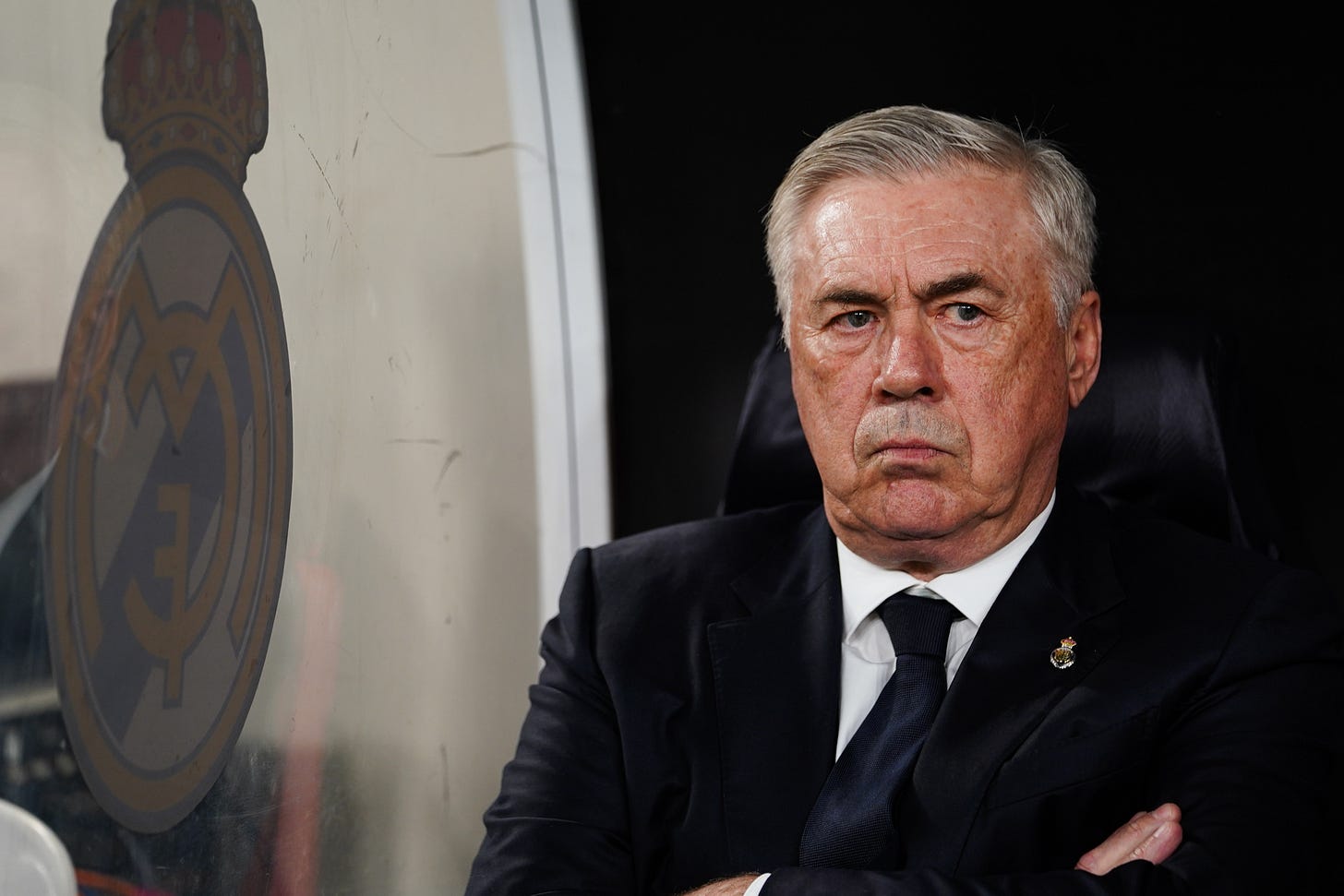
Carlo Ancelotti has led Real Madrid to three Champions League crowns across his two spells as coach with Los Blancos and the Italian is the most decorated manager in the club’s entire history with 15 major trophies overall.
But Ancelotti has been in charge for some of Madrid’s most damaging defeats to Barcelona in El Clásico. Ahead of Sunday’s Supercopa clash, the 65-year-old said his players would learn from their 4-0 loss to Barça in October, but this was another disastrous display and reports in Spain claim his job is now under threat.
And yet, for all Madrid’s struggles in those two fixtures, the team remains in contention for the title in LaLiga and can never be ruled out in the Champions League – despite an unconvincing run in the group stages and qualification for the knockout rounds still not guaranteed.
A master at finding tactical solutions, Ancelotti may yet lead Los Blancos to some silverware at the end of this season if he is kept on, having recently won the FIFA Intercontinental Cup and the UEFA Super Cup back in August.
Whoever is in charge, Barça and Madrid meet again in LaLiga in the Catalan capital on May 11th, with further fixtures in the Champions League and the Copa del Rey also still a possibility.
Barça’s big wins over Real Madrid since 2009
Real Madrid 2-6 Barcelona (May 2009)
Barcelona 5-0 Real Madrid (November 2010)
Real Madrid 0-4 Barcelona (November 2015)
Barcelona 5-1 Real Madrid (October 2018)
Real Madrid 0-4 Barcelona (March 2022)
Real Madrid 0-4 Barcelona (October 2024)
Real Madrid 2-5 Barcelona (January 2025)
* Read more in this piece I wrote earlier in the week for FourFourTwo



